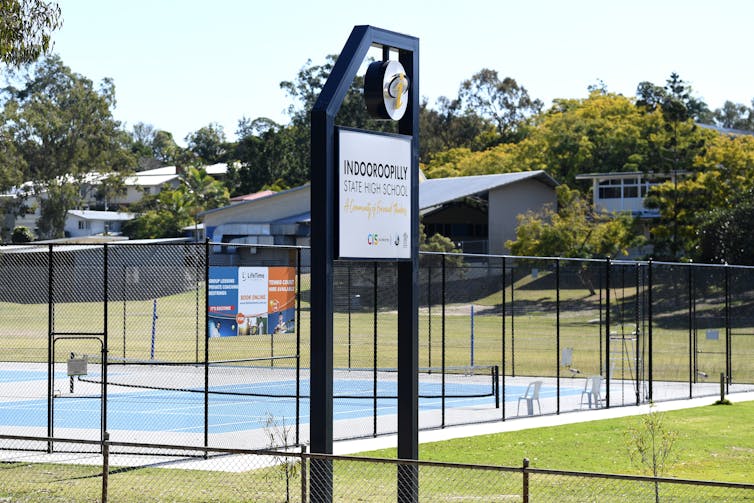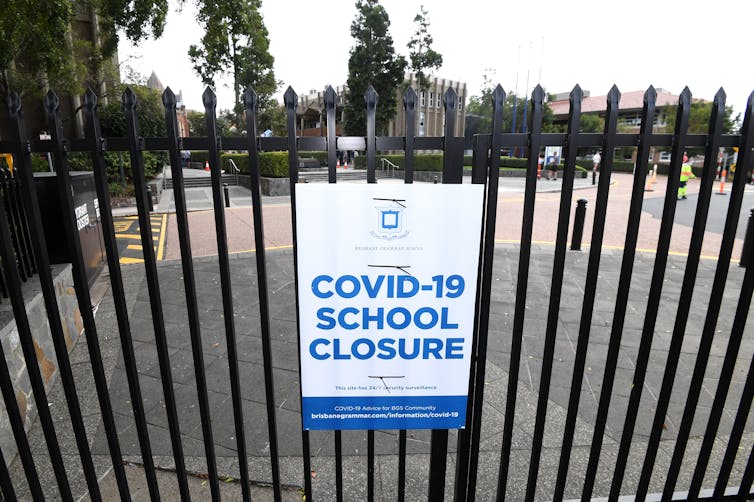School students at the heart of a COVID outbreak change the story of how it spreads
- Written by Naomi Barnes, Senior Lecturer, School of Teacher Education & Leadership, Queensland University of Technology
The central role of schools in the Brisbane COVID-19 outbreak means the virus might move through the community differently from previous outbreaks. Previously, the focus has been on the spread of the virus through the aged care sector and via service workers. People in education systems move and interact differently.
Sociology can provide a useful lens for understanding how the virus is moving. The type of insight sociologists can give is an organised story behind the contact tracing list based on their knowledge of how the sector at the centre of an outbreak works. Epidemiologists and policymakers can then draw on these systematic stories to help communicate the transmission risks and manage public responses to their decision-making.
Read more: Should we vaccinate children against COVID-19? We asked 5 experts
An analysis of the Queensland contract tracing list shows many of the exposure sites are typical of school children travelling on public transport. Their families are also driving them around to attend social, medical and educational activities after school.
 Queensland’s first identified COVID-19 case in the current outbreak of the Delta variant was a student at Indooroopilly State High School.
Dan Peled/AAP
Queensland’s first identified COVID-19 case in the current outbreak of the Delta variant was a student at Indooroopilly State High School.
Dan Peled/AAP
How do children change the spread?
Sociological network analyses can methodically explain the nuances and dynamism of how the virus will move differently via children compared to adults. It will move differently again for university and TAFE students and teenagers.
For example, primary school children are more likely to move through multiple sites after school. Sporting lessons and care outside school hours (categories of multiple exposure sites on the list) mean children could move from one big group to another big group.
A teenager will move differently again. Teenagers are more likely to move independently to and from school, their after-school activities and home. They use public transport more than younger children do, bringing them into contact with larger groups than in the family car. They also congregate in places like shopping centres to do things teens like to do: shop, share food and canoodle.
Families, especially those with more than one child, have after-school activities in varied places, hugely multiplying possible exposure sites. Children will encounter more people than an adult who goes to the shops, gym or takeaway after work. But an adult may be a parent and have the child, who has been in multiple big groups through the day, with them.
Read more: Drive to football? Take your kids to the pool? You're probably emitting an astonishing amount of CO₂
School contacts extend far and wide
Currently, there are nine Brisbane schools at the centre of the spread of the Delta variant of the virus. Many of these schools are connected via postcode. But postcode does not tell the whole story.
The more concerning narrative is that these schools are connected systemically. For example, Brisbane Grammar School boys will most likely have sisters at Brisbane Girls Grammar. The primary school, Ironside State School, is a feeder school for many affected schools. In other words, primary school children have older siblings at the high schools.
 Brisbane Grammar School has many connections to other schools through family and friends.
Dan Peled/AAP
Brisbane Grammar School has many connections to other schools through family and friends.
Dan Peled/AAP
Many of the schools are also independent schools that children commute to from all over Brisbane. This means the single child or set of siblings at one school affected by the virus could very easily move the virus outside the area. On the contact tracing list, we are seeing cases emerge not only in neighbouring suburbs but also in suburbs in completely different areas of Brisbane.
Read more: The hidden traffic impacts of private schooling
What does this mean for managing outbreaks?
This movement of the virus through the education system reveals a need to shift the decision-making about schools, teachers and examinations away from only how the virus might get into schools to also consider how the virus is getting out of schools.
Schools can manage social distancing, hand washing and mask wearing when the students are at school but cannot oversee those things out of school. No matter how careful a school is about its COVID-safe procedures, the Brisbane outbreak has shown that those who manage education spaces, like principals and teachers, cannot control all the variables. Public discussions that suggest they can is simply unreasonable and demoralising.
Read more: 'Exhausted beyond measure': what teachers are saying about COVID-19 and the disruption to education
A sociological approach to COVID planning, especially network approaches, like I use, would support governments to make systematic decisions about the social sectors. Current decision-making processes have only considered the surface-level (though still important) purposes of schooling in society, like teaching, assessment and care during work hours. By considering the nuances and dynamic nature of school life, sociology can shed light on options for school closures, examinations, remote learning and schooling the children of essential workers.
Thank you to sociologist Dr Mark Bahnisch for support on this article.
Authors: Naomi Barnes, Senior Lecturer, School of Teacher Education & Leadership, Queensland University of Technology





